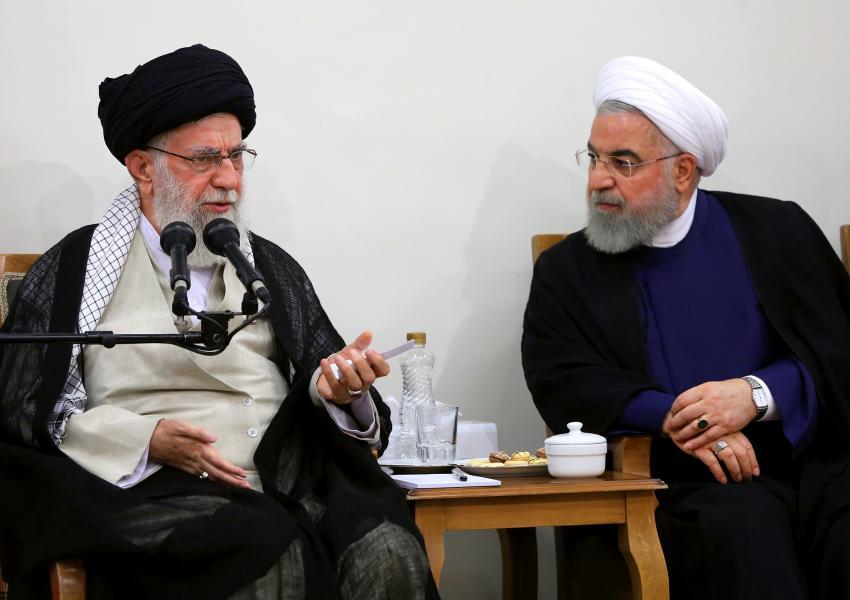
Rouhani And Khamenei Warn Over Cyberspace As Iran’s Virtual Battles Rage
President Hassan Rouhani warned Tuesday [March 23] over the dangers of cyberspace, two days after Supreme Leader Ali Khamenei criticized Iranian authorities for "surrendering" cyberspace to "the enemy" who were spreading "disillusionment" about June’s presidential election. At a ceremony in Tehran to inaugurate online government services, Rouhani said the dangers of the virtual sphere were "higher than in regular circumstances."
On Sunday, in his New Year speech Khamenei called for more assertive management. "All countries manage their cyberspace but in our country some [officials] take pride in letting the cyberspace be loose," he said. "There's nothing to be proud of in this."
Khamenei added that cyberspace should not be relinquished to those discouraging people from voting in Iran’s elections. A social media campaign called ‘No to the Islamic Republic’ launched by pro-monarchy activists in early March, which encourages people to boycott the presidential election, gained momentum after the endorsement of Iran’s exiled Prince Reza Pahlavi.
Khamenei has repeatedly criticized slow progress in launching a regulated national internet network. The National Information Network (NIN) to be established under the Fifth Development Plan Act, is a system of control over internet access and content, blocking websites and social-media platforms deemed illegal, or religiously or politically unacceptable. "I can see that the required effort [to launch the NIN] is not being made," Khamenei said in a speech on August 23, 2020.
Khamenei also often refers to cyber propagandists as "soldiers" in a soft war. The Revolutionary Guards (IRGC) operate a network of online personas, or cyber activists, on social media for propaganda purposes – as do exiled opposition groups.
According to Mohammad-Reza Toyserkani, Khamenei’s representative in the Basij (militia), which is supervised by the IRGC, clerical Basiji have created thousands of accounts on social media to spread propaganda. “Why shouldn’t we use the space when a simple live [post] on Instagram gets millions of views,” he said on January 9. A high-ranking IRGC official, Mohammad-Reza Yazdi, in November said the IRGC had a "cyber-division consisting of 144 cyber-brigades" in Tehran, which in military terms translates to at least 72,000 members.
Mohammad-Javad Azari-Jahromi, Minister of Communications on Monday said that regulating cyberspace was not just a matter for government. "The gap between generations can no longer be prevented by [internet] filters and filtering," he said. "Those who think it is only the government that is responsible for what their children learn and do in the cyberspace are wrong. They should take a look at the children of the officials, whether they are from the right or the left. Many of them could not [even] raise their own children [well]."
In January Prosecutor-General Mohammad-Jafar Montazeri sued Azari-Jahromi for refusing to implement judicial orders and decisions of the Cyberspace Supreme Council (CSC) aimed at blocking access to social media platforms. Hardliners accuse Azari-Jahromi of allowing an onslaught. “Our enemies couldn’t defeat us in direct war and want to overcome us by waging a cultural war," ‘Zahra’ tweeted on March 2. "Mr. Jahromi, what happened to the one billion [tomans, around $24 million] that you spent for filtering?"
The only social media platform not blocked in Iran is Instagram, which Iranian Students Polling Agency (ISPA) in May 2018 said was used by 32 million Iranians and which is common in business and marketing. But while Iran blocks news websites and platforms, and bars apps such as Telegram, Signal, WhatsApp, Facebook and Twitter, controls are readily evaded with widely available anti-filtering software.
Social media has played a growing role in Iranian elections. Organized activities by hardliners, particularly on Twitter, have increased considerably in recent years. Reformists have also long been active on social media.









